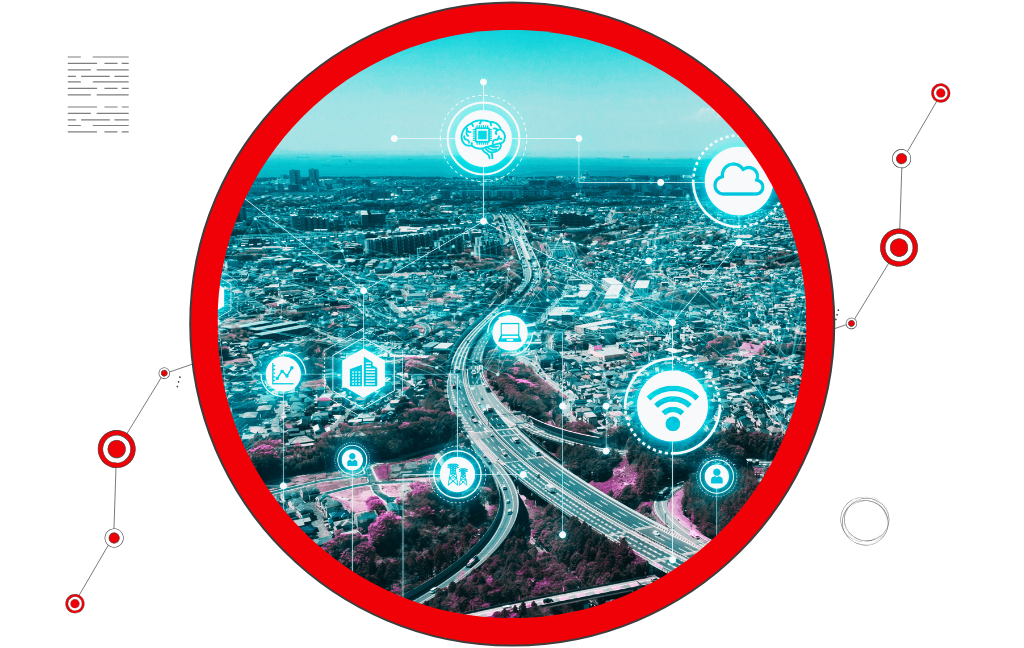Smart Cities

Smart Cities Solutions
Developing intelligent infrastructure and systems for urban environments
To develop and implement smart infrastructure solutions that improve urban living and sustainability.
Intelligent Building Systems:
- | Implementing smart building technologies, such as automated lighting, HVAC systems, and energy management, to enhance efficiency and reduce costs.
Smart Grid Integration:
- | Developing smart grid systems to optimize electricity distribution, improve grid resilience, and enable renewable energy integration.
IoT-Enabled Infrastructure:
- | Deploying IoT sensors and devices to monitor and manage urban infrastructure, including roads, bridges, and public spaces.
Sustainable Urban Planning:
- | Designing and implementing green infrastructure projects, such as parks and green roofs, to enhance urban sustainability and liveability.
Data-Driven Urban Management:
- | Utilizing data analytics and AI to optimize the management of city resources and services.
To provide solutions for intelligent transportation systems, traffic management, and mobility services.
Traffic Management Systems:
- | Implementing real-time traffic monitoring and control systems to optimize traffic flow and reduce congestion.
Public Transit Solutions:
- | Enhancing public transportation services through smart ticketing, real time tracking, and dynamic scheduling.
Smart Parking:
- | Developing smart parking solutions, including automated payment and real-time availability updates, to improve parking efficiency.
Mobility-as-a-Service (MaaS):
- | Integrating various transportation modes into a single service platform, offering users convenient access to multiple mobility options.
Electric and Autonomous Vehicles:
- | Supporting the deployment and management of electric and autonomous vehicles, including charging infrastructure and fleet management.
To deploy digital solutions that enhance public services and citizen engagement.
E-Government Platforms:
- | Developing online platforms for government services, enabling citizens to access services and information digitally.
Citizen Engagement Tools:
- | Implementing tools and platforms that facilitate communication and interaction between citizens and government, such as feedback portals and participatory budgeting.
Digital Identity Solutions:
- | Providing secure digital identity solutions for accessing government services and conducting transactions.
Data Transparency and Open Data:
- | Promoting data transparency by making public data accessible and usable, fostering innovation and accountability.
Smart City Dashboards:
- | Creating dashboards that provide real-time information on city services, resources, and key performance indicators.
To deploy smart solutions for energy, water, and waste management.
Smart Metering:
- | Implementing smart meters for electricity, gas, and water to enable accurate billing, usage monitoring, and demand management.
Energy Management Systems:
- | Developing systems for optimizing energy consumption and integrating renewable energy sources.
Water Management Solutions:
- | Utilizing smart technologies for water distribution, leak detection, and quality monitoring.
Waste Management Systems:
- | Implementing smart waste management solutions, including sensor equipped bins and route optimization for waste collection.
Resource Conservation:
- | Promoting the efficient use of natural resources through data-driven decision-making and public awareness campaigns.
To enhance public safety through advanced surveillance and emergency response systems.
Surveillance and Monitoring:
- | Deploying advanced surveillance systems with AI-based analytics for real-time threat detection and response.
Emergency Response Systems:
- | Implementing integrated communication and coordination systems for emergency response teams.
Public Safety Analytics:
- | Analyzing data from various sources, such as social media and IoT devices, to predict and respond to safety incidents.
Smart Lighting:
- | Installing smart street lighting that adjusts brightness based on pedestrian and vehicular traffic, enhancing safety and energy efficiency.
Disaster Management Systems:
- | Developing systems for monitoring and responding to natural disasters and other emergencies, including early warning systems and evacuation planning.
These smart city solutions leverage advanced technologies to create more efficient, sustainable, and liveable urban environments, enhancing the quality of life for residents and visitors. By integrating smart infrastructure, transportation, governance, utilities, and public safety systems, cities can better manage resources, improve services, and foster economic growth.
